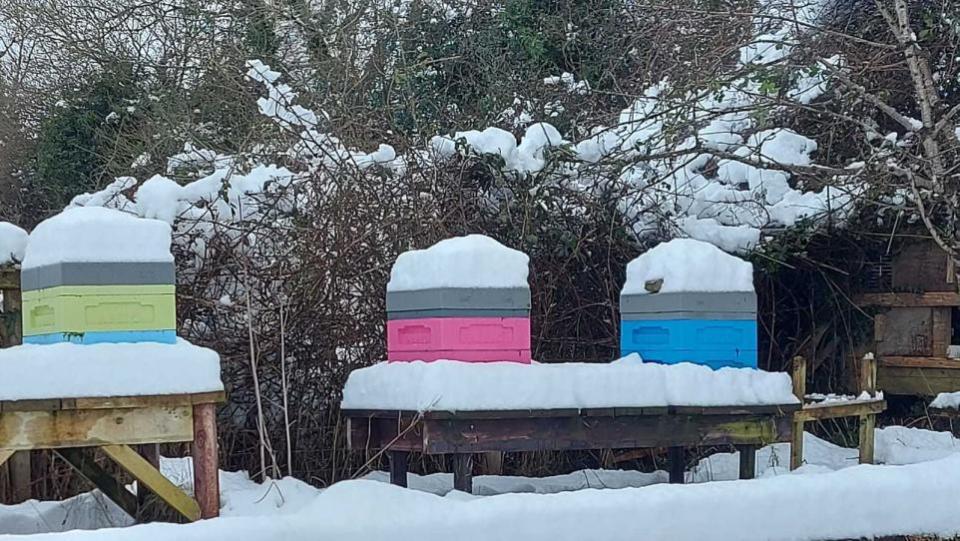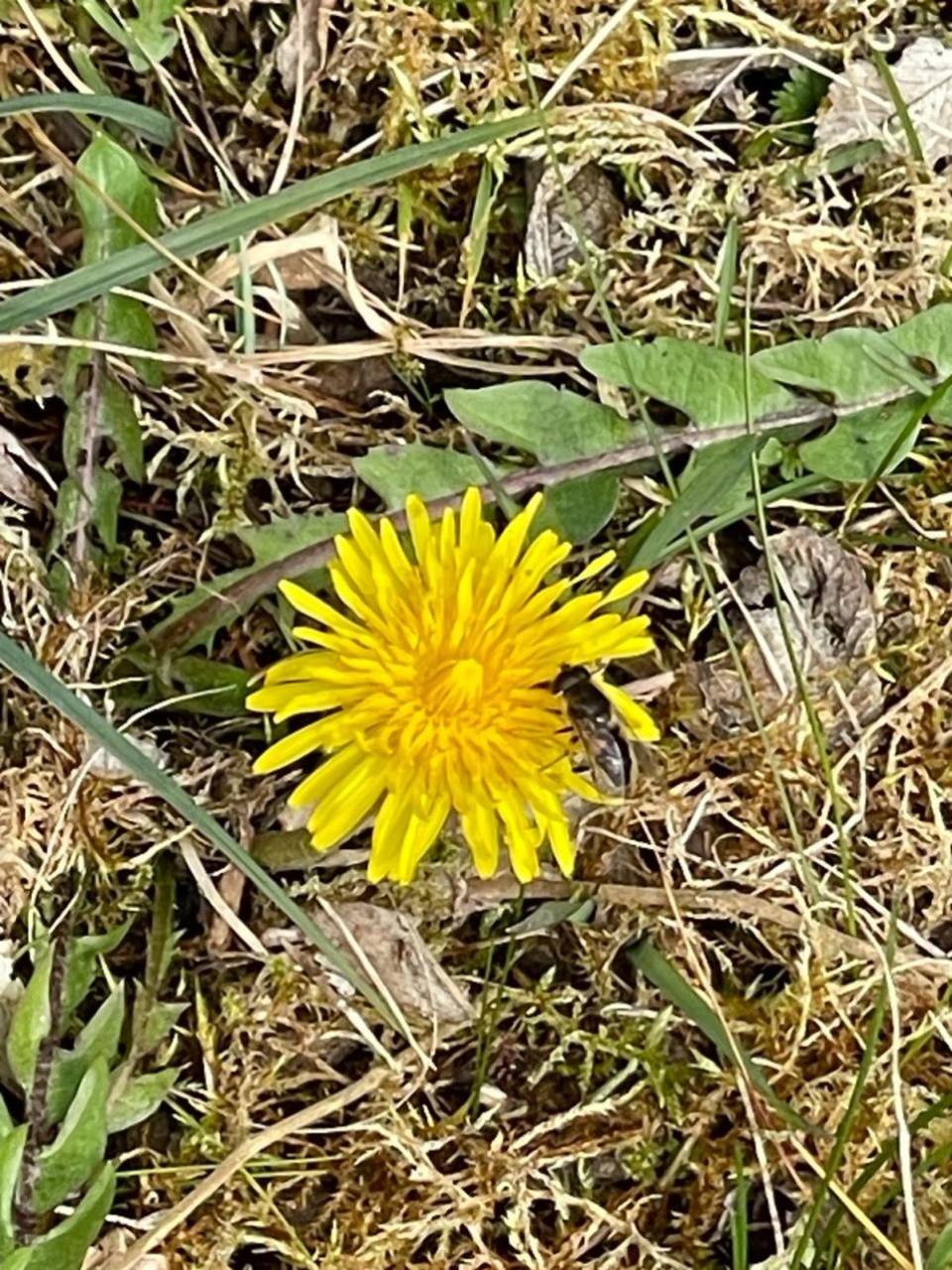Still beekeeping work to be done in a month of changeable weather conditions

March certainly threw some odd weather our way, starting with snow on March 1, with the month progressing with rain aplenty, interspersed with some warm, sunny days which gave people hope that we were all finally through the cold winds which seemed to accompany everything, reports Ethel Irvine from Fermanagh Beekeepers' Association (FBA).
In spite of the cold, Fermanagh hedgerows are abounding with primroses, celandine, wood anemones and wood sorrel – all the wild flowers we expect at this time of the year.
Even dandelions are beginning to show. Wood anemones are interesting in that they can be indicators of ancient woodland.
They spread very slowly, and if a large patch occurs, it can be hundreds of years old.
There are some quite large areas of the white wind flower, as it is sometimes called, in Castle Archdale Park, growing along the banks of a stream (which can be turbulent at times), making the walk alongside the lake pleasurable in any weather.
Our bees have been flying every time they have had the opportunity, foraging for the fresh pollen so necessary for the rearing of brood as the hives build up, and making the most of any nectar available to them.
Our gardens are playing their part in brightening up our days with the tiny cillas, grape hyacinths, spring heathers amongst those plants vying for the attention of pollinating insects.
At the moment, I am not seeing a lot of honeybees in the garden, as they seem to have found forage further afield as evidenced by the heavy loads of orange pollen in their pollen baskets, leaving the garden to the attention of bumble bees and hoverflies, who have a much shorter flying range.
In spite of the fact that first and second inspections were outlined in the last two reports from FBA, I have not opened colonies yet.

Colourful hives in the March snows.
I am made content that all is well by watching what is happening from outside the hive.
Large numbers of bees are flying and bringing in forage; there is evidence that they are still using their winter stores, from the debris falling through the open mesh floor, and hefting shows that they have plenty of food.
I do lift the roof to make sure that the crownboard is dry, but that’s as far as it goes.
If there is little evidence of flying bees, do lift off the roof of that particular hive and look through the feed holes in the crownboard.
If there is no sign of life, gently ease the crownboard up to confirm (or otherwise, since the bees may not be in the seams between the frames directly beneath the feed holes) your worst fears.
If the colony has perished, close it up until you have time to remove, as it may be a source of disease, and once discovered by other colonies, it will be robbed, spreading the disease around the apiary.
If the bees are ‘freshly’ dead, package them up and send to AFBI for testing.
We do need to be careful at this time of year. The long-lived winter bees are dying off and being replaced by young bees emerging from their cells, but their numbers are not necessarily great as yet.
The queen is laying an increasing number of eggs, which hatch after three days, and the resulting larvae require the attention of house bees to supply them with brood food and to keep them warm, so we must keep a close eye on their source of energy – that is, their stores, while at the same time making sure that the brood nest is not clogged with food, leaving the queen with no room to lay.

Aine Enright, Ethel Irvine, Mary McGonigle and Jenny Parkes with Brian Dane (tutor) and Stephen Hey (Chairman, FBA).
In March, the UBKA-sponsored Bee Health Workshops were held in three locations in Northern Ireland, one of which was Enniskillen.
The presenters were Jack Silberrad, a Seasonal Bee Inspector from England, and Tom Williamson, Chief Bee Inspector at DAERA.
European Foul Brood has become a greater problem in Northern Ireland during the past 18 months, and Jack spoke extensively about the symptoms and how to recognise the disease.
He advised that we should all have sharp-nosed tweezers in our bee boxes so that we could do a quick autopsy at the hives by pulling out the intestine of a bee.
If it is white, then we should be reporting the finding to DAERA and, as Valentine Hodges, Chair UBKA, emphasised during the question time afterwards, sending samples to AFBI.
Jack reminded us that if one colony in our apiary was infected, then most of the others were likely to have the infection also.
He went on to say that apiary hygiene was one of the best defences against the spread of any disease.
The hygiene included keeping ALL bee equipment, including smokers and suits, clean; ensuring that frames were not transferred between an infected colony and others in the apiary; keeping all equipment for different apiaries separate; and not keeping old frames, black with the residues of continual brood rearing, in colonies.
He concluded that investment in a packet of washing soda crystals could save us much distress!
Jack went on to consider the impact of swarm collection from sources unknown on our apiaries if considerable care about their handling was not taken.
He recommended isolation in disposable boxes before introduction into an apiary or being passed on to another beekeeper.

A bee approaches a dandelion.
Tom spent some time explaining that the lack of trained bee inspectors made spot checks for disease across Northern Ireland [difficult] and they were able to respond to beekeepers’ requests only.
He also emphasised the looming spectre of the Asian Hornet, which is a consummate destroyer of pollination insects, including honeybees.
It has not yet been identified in Northern Ireland, but Tom says it’s just a matter of time.
If a colony of these carnivorous Asian Hornets discovers a hive of bees, they will home in on it, and it will be its major source of food until it is wiped out.
Asian Hornets are also a danger to animals and humans, as the insect has a vicious sting. It is larger than our native wasp species, and has a yellow face, yellow legs and its abdomen has black segments with one broad band of yellow.
The Asian hornet is an invasive species and, as such, should be reported to DAERA.
At our last meeting, we were delighted when four of our members were awarded with their endorsed Level 3 certificates in Proficiency in Beekeeping by Ethel Irvine, member of the UBKA Education and Assessment Team Education.
They are members of the first cohort of students from Ulster Beekeepers’ Association to complete this Open College Network Northern Ireland-endorsed course, which was developed by UBKA Team, and are to be congratulated on completing a total of 10 Units.
Their tutor was Brian Dane and he was thanked for all his work done over the more than two years needed to cover the content of the course, and it was evident from the reactions of the students how much they had enjoyed and appreciated his tuition.
Our next meeting will be on Thursday, April 25 at 8pm in Fermanagh House, Enniskillen.
The main speaker will be John Greenaway, from the Native Irish honey Bee Society (NIHBS), who will explain the process for the establishment of areas of conservation for our native Apis mellifera mellifera, and the implications for the bee.
Thomas McCaffrey will give an account of the activities of the queen-rearing group.
We remind our beginners in beekeeping groups that complementary membership is for the year in which they take the course tutored by Jackie, and that they should pay membership from the January following, so that they may receive notification of the activities of the association and benefit from interaction with members to improve their beekeeping skills and (maybe) solve some of the problems they encounter.
We would be delighted to welcome you to the monthly meetings, where visiting speakers, beekeeping demonstrations and workshops are all available free for our members.

 Yahoo News
Yahoo News 
